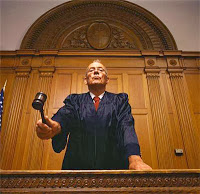 Getting arrested is an emotional rollercoaster. It can and will affect
the rest of your life. Clients hire me with the expectation that I can
get their charges reduced or dropped. Others hire me simply to be their
voice and help them navigate their way through the court system. As a
North Georgia lawyer, I travel to various trial courts in different counties
to practice law. In my experience, while most courts have their own unique
way of operating, they all tend to follow a similar path.
Getting arrested is an emotional rollercoaster. It can and will affect
the rest of your life. Clients hire me with the expectation that I can
get their charges reduced or dropped. Others hire me simply to be their
voice and help them navigate their way through the court system. As a
North Georgia lawyer, I travel to various trial courts in different counties
to practice law. In my experience, while most courts have their own unique
way of operating, they all tend to follow a similar path.
An arrest triggers the beginning of the criminal procedure process. The first court date for someone who has been arrested is arraignment. At this time, the person arrested learns about the State charges and has the option to plead guilty or not guilty. (In Atlanta, this court date could be as soon as the Monday after a weekend arrest.) If the arrested individual is planning to hire a private attorney, it is important that they are hired prior to arraignment. This is an important date in the criminal justice process, and one that a private attorney should attend. Although someone who has been arrested is presumed not guilty in criminal law, the arraignment is the first formal event in court and is also used as a status conference to make sure the parties are on the same page, even if everyone disagrees about the criminal charges. Additionally, an attorney only has a few days after the arraignment court date to file legal motions in a criminal case case, which is the reason why individuals who have been arrested should never wait until the last minute to hire an attorney. This is because there are certain legal motions in Georgia that must be filed with the court within 10 days of the arraignment. Failure to do so could have devastating consequences in criminal cases.
The next court date in a criminal case is called calendar call or pre-trial conference. Typically, there will be far less people at this court date. The hired attorney, or in some instances court-appointed attorney, will meet with the prosecutor to discuss the details of the case and the plea offer. A plea offer is a negotiated consequence given to arrested individuals to expedite the criminal justice process. The person accepting a plea offer may be required to plead guilty or nolo contendre in order to avoid a trial. Generally, the plea offer is a lighter punishment than the prosecutor believes the arrested individual will receive at trial if a jury finds them guilty. About 95 percent of criminal cases are resolved with a plea offer. A competent and experienced attorney understands the intricacies associated with plea offers and is able to advise their clients of their options.
If the person who has been arrested chooses not to accept a prosecutor's plea offer, the final court date is a trial. A trial requires the prosecutor to prove the individual on trial is guilty beyond a reasonable doubt. This standard is the highest and most difficult to overcome in the court system. Police officers, witnesses, and victims will be required to testify at this court date and explain to a jury what the arrested individual did or did not do. In defense of the arrested individual, the attorney representing the accused is allowed to call witnesses on their client's behalf or even ask the client to testify. However, it is important to point out that individuals who have been arrested have a Constitutional right to remain silent.
If you, a member of your family or a friend are arrested, I highly recommend seeking assistance from a professional attorney who has the experience to help you navigate the Georgia court system.
